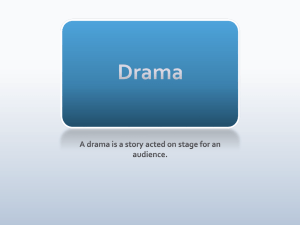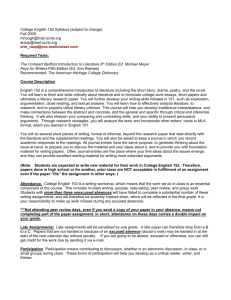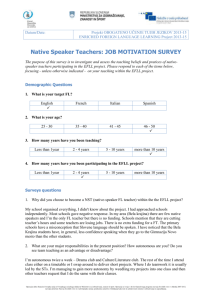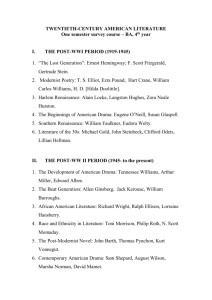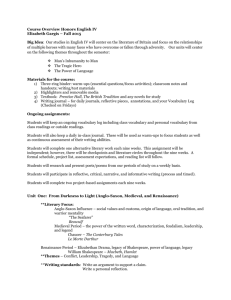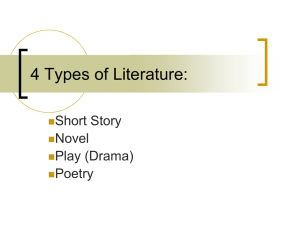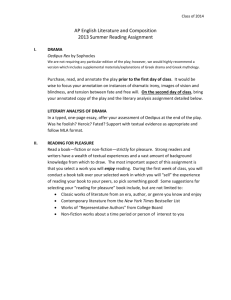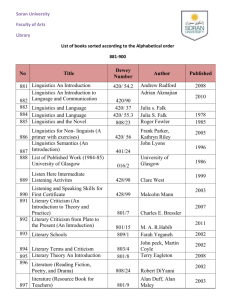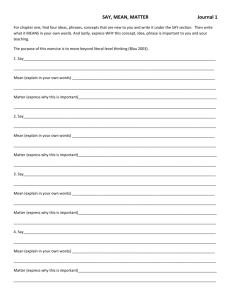English I Syllabus Spring Semester Week 1: Topic: Introduction
advertisement
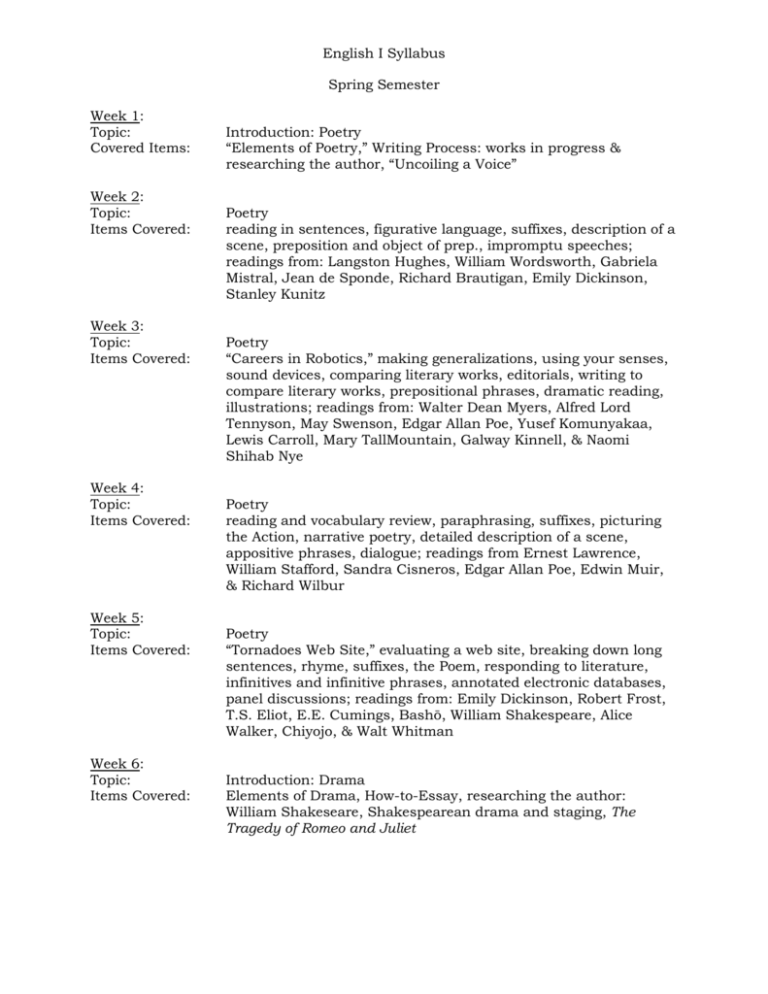
English I Syllabus Spring Semester Week 1: Topic: Covered Items: Week 2: Topic: Items Covered: Week 3: Topic: Items Covered: Week 4: Topic: Items Covered: Week 5: Topic: Items Covered: Week 6: Topic: Items Covered: Introduction: Poetry “Elements of Poetry,” Writing Process: works in progress & researching the author, “Uncoiling a Voice” Poetry reading in sentences, figurative language, suffixes, description of a scene, preposition and object of prep., impromptu speeches; readings from: Langston Hughes, William Wordsworth, Gabriela Mistral, Jean de Sponde, Richard Brautigan, Emily Dickinson, Stanley Kunitz Poetry “Careers in Robotics,” making generalizations, using your senses, sound devices, comparing literary works, editorials, writing to compare literary works, prepositional phrases, dramatic reading, illustrations; readings from: Walter Dean Myers, Alfred Lord Tennyson, May Swenson, Edgar Allan Poe, Yusef Komunyakaa, Lewis Carroll, Mary TallMountain, Galway Kinnell, & Naomi Shihab Nye Poetry reading and vocabulary review, paraphrasing, suffixes, picturing the Action, narrative poetry, detailed description of a scene, appositive phrases, dialogue; readings from Ernest Lawrence, William Stafford, Sandra Cisneros, Edgar Allan Poe, Edwin Muir, & Richard Wilbur Poetry “Tornadoes Web Site,” evaluating a web site, breaking down long sentences, rhyme, suffixes, the Poem, responding to literature, infinitives and infinitive phrases, annotated electronic databases, panel discussions; readings from: Emily Dickinson, Robert Frost, T.S. Eliot, E.E. Cumings, Bashō, William Shakespeare, Alice Walker, Chiyojo, & Walt Whitman Introduction: Drama Elements of Drama, How-to-Essay, researching the author: William Shakeseare, Shakespearean drama and staging, The Tragedy of Romeo and Juliet Week 7: Topic: Items: Covered: Week 8: Topic: Items Covered: Week 9: Topic: Items Covered: Week 10: Topic: Items Covered: Drama The Tragedy of Romeo and Juliet, using text aides, dialogue, blank verse, reading in sentences, paraphrasing, dramatic speeches, word roots, abstracts, editorial Drama The tragedy of Romeo and Juliet, persuasive letters, parody, gerund & gerund phrases, staged performances, annotated flow charts, film reviews Drama “Atlas of Italy,” kimming and scanning, comparing literary works: archetypal theme(s), writing to compare literary works; reading from Ovid & William Shakespeare Drama The Inspector General by Anton Chekov, drawing conclusions from dialogue and stage directions, comedy and dramatic irony, word roots, research report, main and subordinate clauses, readers theatre presentation, informational charts, short plays Week 11: SPRING BREAK Week 12: SPRING BREAK Week 13: Topic: Items Covered: Week 14: Topic: Items Covered: Week 15: Topic: Items Covered: Drama “Review of a Translation of Chekhov’s Plays,” evaluate credibility of an author, writing to compare literary works: satire; readings from: Oscar Wilde & Henry Alford Introduction: Themes in Literature Introduction: Heroism, “Play Hard; Play Together; Play Smart, from The Carolina Way,” writing for assessment, researching an author: Homer Themes in Literature analyzing the influence of cultural and historical context, word roots, Epic hero, Epic simile, identifying influences on your own reading and responses, complex and compound sentences, debate, reading from Odyssey Week 16: Topic: Items Covered: Week 17: Topic: Items Covered: Week 18: Topic: Items Covered: Themes in Literature “Application for an Archaeological Dig,” following directions, writing to compare literary works: contemporary interpretations, readings from: Edna St. Vincent Millay, Margaret Atwood, Derek Walcott, Constantine & Cavafy Themes in Literature compare/contrast, using context clues, word roots, generating questions during/after reading, protagonist/antagonist, journal entries, commas, interviews; readings from: George Toudouze & Sir Arthur Conan Doyle Themes in Literature set a purpose for reading, author’s purpose and philosophical assumptions context clues/word roots, letter writing, colons/semicolons/ellipses, writing to compare literary works: tall tale & myth; readings from: encyclopedia, Chief Dan George, Nelson Mandela, Harold W. Felton, Edith Hamilton
